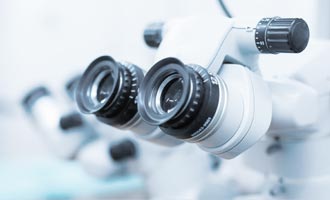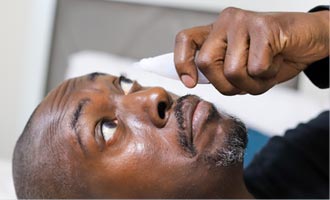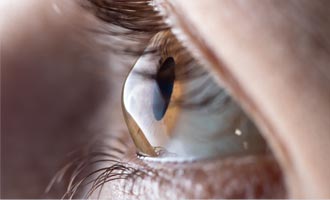Ophthalmologist or Optometrist?
An ophthalmologist is a medical doctor who can perform medical and surgical interventions to treat eye conditions such as galucoma, cataracts, iritis, and burns of the eye. An optometrist is an eye doctor who can examine, diagnose, and treat your eyes and fit you for eyeglasses and contact lenses.
Eye Exams & Screenings
Who Should Have an Eye Exam?
Because eye disorders and diseases may not have symptoms, your best defense against vision loss is to have regular eye exams. Early detection and treatment could prevent vision loss.
A comprehensive eye exam can take an hour or more, based on the number and complexity of tests required to fully evaluate your vision and eye health.
Adults should have a baseline eye exam beginning at age 40. A baseline exam may detect eye diseases common in adults, and there is greater opportunity for early treatment and prevention of vision loss.
People of any age who have symptoms or risk factors eye disease should see an ophthalmologist to determine how often to have eye exams. These risk factors include:
- diabetes,
- high blood pressure, or
- a family history of eye disease.
If you have any of the following symptoms, contact our office to schedule an eye exam.
- a sudden change in vision
- everything looks dim
- you see flashes of light
- you have eye pain
- you're experienceing double vision
- there is fluid coming from the eye
- eye inflammation is present
Screenings for Eye Disease & Disorders
There are a variety of tests and screening performed during a comprehensive eye exam including:
- Visual acuity tests: measure the sharpness of your vision
- Cover test: checks how your eyes work together
- Ocular motility testing: determines how well your eyes can follow a moving object and/or quickly move between and accurately fixate on two separate targets
- Stereopsis test: checks for eye teaming which enables depth perception and appreciation of the 3D nature of objects
- Slit lamp exam: examines the structure of the eye including the eyelids, cornea, conjunctiva, iris, lens, and possibly the retina and optic nerve to detect cataracts, macular degeneration, and diabetic retinopathy
- Non-contact tonometry (NCT): measures the pressure in your eye to test for glaucoma
- Pupil dilation: to obtain a better view of the eye's internal structures
- Visual field test: to check for the possible presence of blind spots, or "scotomas" in your peripheral vision
In some cases, more specialized eye tests may be recommended on a referral basis to retinal specialists.
Our Featured Services
Cataract Surgery
Cataracts are very common in older people and usually develop slowly. Cataract surgery is performed on an outpatient basis and can greatly improve vision.
Glaucoma Treatment & Management
Glaucoma is a group of diseases that can damage the eye's optic nerve, and it is a leading cause of blindness in the United States. There is no cure, but glaucoma can usually be controlled.
Corneal Transplant
A corneal transplant is surgery to replace the cornea with tissue from a donor. It is one of the most common transplants done.



